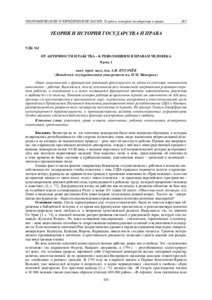Please use this identifier to cite or link to this item:
https://elib.psu.by/handle/123456789/20690Full metadata record
| DC Field | Value | Language |
|---|---|---|
| dc.contributor.author | Пугачев, А. Н. | - |
| dc.date.accessioned | 2017-10-31T07:02:24Z | - |
| dc.date.available | 2017-10-31T07:02:24Z | - |
| dc.date.issued | 2017 | - |
| dc.identifier.citation | Вестник Полоцкого государственного университета. Серия D, Экономические и юридические науки. - 2017. - № 5. – С. 103-113. | ru_RU |
| dc.identifier.issn | 2070-1632 | - |
| dc.identifier.uri | https://elib.psu.by/handle/123456789/20690 | - |
| dc.description | From Antiquity and Slavery – to Revolutions and Human Rights А. Pugachev | ru_RU |
| dc.description.abstract | Опыт американской и французской революций фокусируется на одном из ключевых институтов античности – рабстве. Выясняется, почему успешная во всех отношениях американская революция сохранила рабство, а скандальная и в целом неудавшаяся французская признала невозможность равенства и свободы без его отмены. Показана история рабства во временном периоде от античности до XIX века, причины его восстановления в христианском мире, терпимость восприятия в интеллектуальной среде европейского Просвещения. Изучаются документы революционной эпохи республиканизма США и Франции, разновекторность развития этих государств последующего периода. На примере Томаса Джефферсона иллюстрируются парадоксальность и противоречивость взглядов конституционных реформаторов. Особое внимание уделяется библейскому фактору в восприятии рабства и свободы.= The experience of the American and French revolutions focuses on one of the key institutions of antiquity – slavery. It becomes clear why the American revolution, which was successful after all relations, kept slavery, and the French revolution, scandalous and in general unfortunate, recognized impossibility of equality and freedom without its cancellation. Slavery history in the temporary period from antiquity till the 19th century is shown. The reasons for the restoration of slavery in the Christian world, the tolerance of perception in the intellectual environment of the European Enlightenment are shown. The reasons of restoration of slavery in the Christian world, tolerance of perception in the intellectual environment of the European Enlightenment are shown. Documents of a revolutionary era of a republicanism of the USA and France, diversity of development of these states of the subsequent period are studied. The paradoxicality and discrepancy of views of the constitutional reformers on the example of Thomas Jefferson are illustrated. Special attention is paid to a bible factor in perception of slavery and freedom. | ru_RU |
| dc.language.iso | ru | ru_RU |
| dc.publisher | Полоцкий государственный университет | ru_RU |
| dc.relation.ispartof | Веснік Полацкага дзяржаўнага ўніверсітэта. Серыя D, Эканамічныя і юрыдычныя навукі | be_BE |
| dc.relation.ispartof | Herald of Polotsk State University. Series D, Economics and law sciences | en_EN |
| dc.relation.ispartof | Вестник Полоцкого государственного университета. Серия D, Экономические и юридические науки | ru_RU |
| dc.relation.ispartofseries | Серия D, Экономические и юридические науки;2017. - № 5 | - |
| dc.rights | open access | ru_RU |
| dc.subject | Государственный рубрикатор НТИ - ВИНИТИ::ОБЩЕСТВЕННЫЕ НАУКИ::Государство и право. Юридические науки | ru_RU |
| dc.subject | Революция | ru_RU |
| dc.subject | Права человека | ru_RU |
| dc.subject | Античность | ru_RU |
| dc.subject | Рабство | ru_RU |
| dc.subject | Конституция | ru_RU |
| dc.subject | Демократия | ru_RU |
| dc.subject | Колонизация | ru_RU |
| dc.subject | Христианство | ru_RU |
| dc.subject | Revolution | ru_RU |
| dc.subject | Human rights | ru_RU |
| dc.subject | Antiquity | ru_RU |
| dc.subject | Slavery | ru_RU |
| dc.subject | Constitution | ru_RU |
| dc.subject | Democracy | ru_RU |
| dc.subject | Colonization | ru_RU |
| dc.subject | Christianity | ru_RU |
| dc.title | От античности и рабства – к революциям и правам человека. Часть 1 | ru_RU |
| dc.type | Article | ru_RU |
| dc.identifier.udc | 342 | - |
| Appears in Collections: | 2017, № 5 | |
Files in This Item:
| File | Description | Size | Format | |
|---|---|---|---|---|
| 103-113.pdf | 317.01 kB | Adobe PDF |  View/Open |
Items in DSpace are protected by copyright, with all rights reserved, unless otherwise indicated.